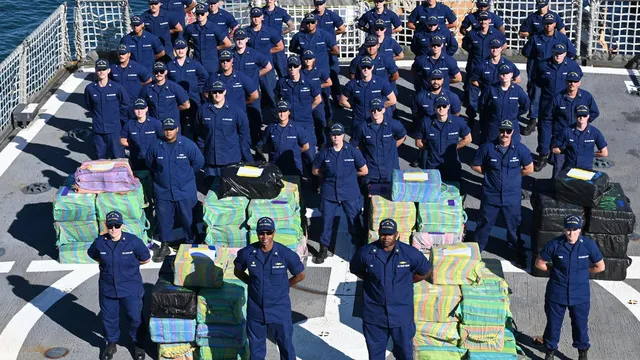
Coast Guard interdicts a historic drug haul at sea
2025-02-06 13:54- The U.S. Coast Guard cutter Campbell completed a two-month anti-drug trafficking operation.
- During the mission, 8,061 pounds of cocaine were seized, with a street value of $91 million.
- The operation signifies a substantial effort in combating drug trafficking at sea and highlights the importance of transnational cooperation.
Express your sentiment!
Insights
In a recent operation, the U.S. Coast Guard successfully intercepted a significant shipment of cocaine during a two-month patrol mission across the Caribbean and Eastern Pacific regions. This operation, which culminated recently, resulted in the seizure of approximately 8,061 pounds of cocaine valued at around $91 million. The Coast Guard cutter Campbell initiated this patrol mission focusing on drug trafficking hotspots, which led to the identification and intervention of illegal operations at sea. As part of the coordinated mission, the crew detained 49 suspected smugglers who were allegedly involved in drug trafficking activities. The operation was not only crucial in preventing drugs from entering the U.S. but also served to support international efforts to combat transnational criminal organizations. The crew's interaction included turning over 26 suspects to U.S. authorities in Fort Lauderdale, Florida, allowing for federal prosecution by the Department of Justice. The commanding officer of the Campbell, Cmdr. Jonathan Harris, praised the crew's commitment to their mission, emphasizing their dedication during challenging circumstances, particularly during the holiday season when they were away from their families. Additionally, the Coast Guard's mission was part of a broader military Joint Interagency Task Force, which collaborates with numerous U.S. agencies and international partners to dismantle narcotics trafficking networks. The importance of such operations highlights the ongoing challenges faced by authorities in curbing the drug trade across international waters. The Coast Guard also participated in humanitarian efforts during their patrol, providing assistance in a separate search and rescue mission, showcasing their multi-faceted role beyond just enforcement. Meanwhile, in Colombia, authorities intercepted a semi-submersible vessel, commonly known as a 'narco sub,' loaded with over 5,000 pounds of cocaine. This incident marked Colombia's first seizure of such a vessel in the year, illustrating the ongoing battle against drug trafficking in the region. The semi-submersible was found with 111 bundles of cocaine, and the operation resulted in the arrest of three individuals. These drug transport methods are notorious for their ability to evade detection, underscoring the need for continued vigilance and international cooperative efforts in combating drug-related crime.
Contexts
Drug trafficking is a significant issue affecting U.S. communities, leading to various social, economic, and health-related challenges. The illegal drug trade contributes to increased crime rates, as trafficking organizations often engage in violent behavior to protect their interests and territories. This violence can spill into neighborhoods, creating an environment of fear and instability for residents. Communities affected by drug trafficking often experience higher rates of homicides, assaults, and other violent crimes, severely undermining the sense of safety and security for their inhabitants. In addition, drug trafficking contributes to the proliferation of gang activity, which further exacerbates the presence of violence and lawlessness in affected areas, complicating community cohesion and rehabilitation efforts. It is crucial to understand that the consequences of drug trafficking extend beyond immediate crime rates, affecting the broader fabric of community life. \n\nEconomically, drug trafficking places a heavy burden on communities. Local law enforcement and emergency services face increased demands due to the challenges posed by drug-related crimes and health emergencies. Resources that could be allocated to education, infrastructure, or social services are often diverted to combat the consequences of drug trafficking. Furthermore, affected communities may experience decreased property values and economic destabilization as residents move away from areas plagued by drug activity. The overall societal cost of drug trafficking can be extensive, including increased taxation to fund public safety measures and healthcare interventions related to substance abuse. \n\nFrom a health perspective, drug trafficking has profound implications for public health in U.S. communities. The widespread availability of illicit drugs contributes to substance use disorders, which can lead to increased rates of addiction, overdose, and related health complications. Overdose deaths, particularly from opioids and synthetic drugs, have reached epidemic levels, straining healthcare systems and resources. Communities often face challenges in providing adequate treatment and recovery services to those affected by drug addiction, further perpetuating the cycle of dependence and socio-economic decline. The stigma associated with drug use can hinder affected individuals from seeking help, leading to prolonged suffering and societal isolation. \n\nEfforts to combat drug trafficking and its effects require a multi-faceted approach, involving community engagement, law enforcement, public health initiatives, and policy reform. Building strong community networks and fostering collaboration among stakeholders can create a united front against the challenges posed by drug trafficking. Education and prevention programs must be prioritized to deter substance abuse before it escalates to more serious problems. Comprehensive treatment options for those struggling with addiction are vital, as addressing the root causes and providing support can aid in recovery, ultimately benefiting communities as a whole. By tackling the issue of drug trafficking with a holistic strategy, U.S. communities can begin to heal and develop a safer and healthier environment for all.